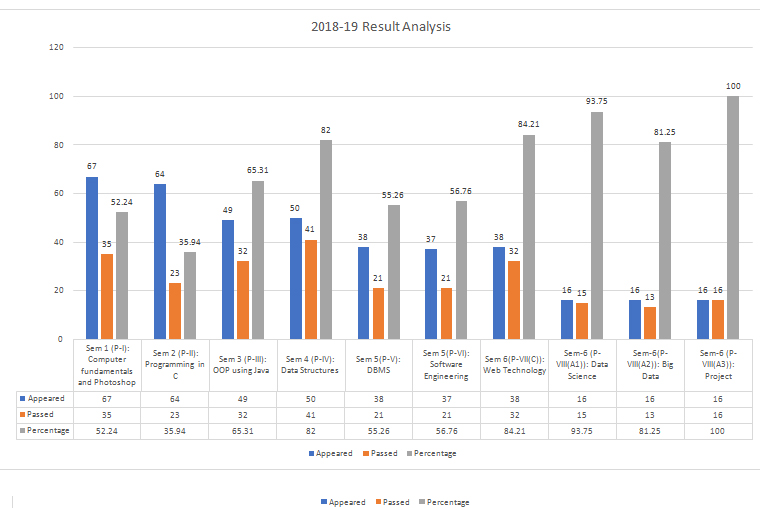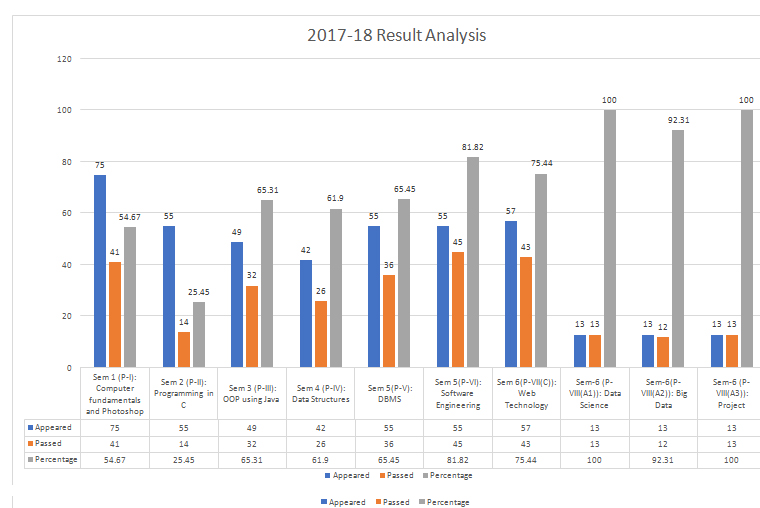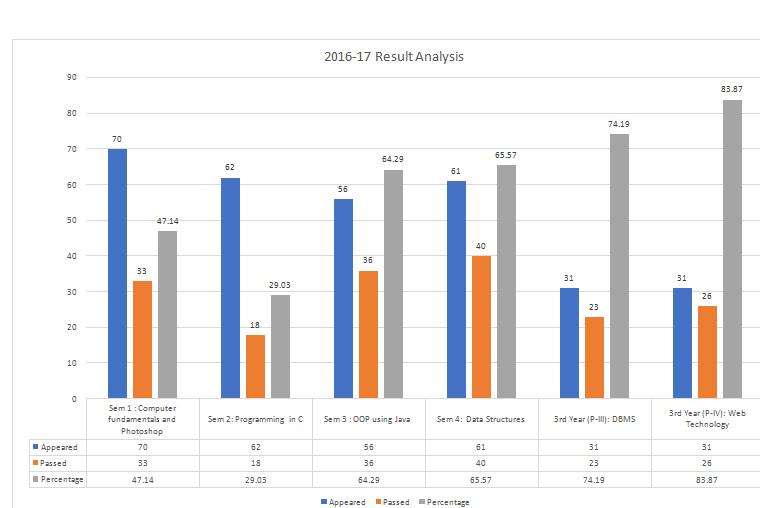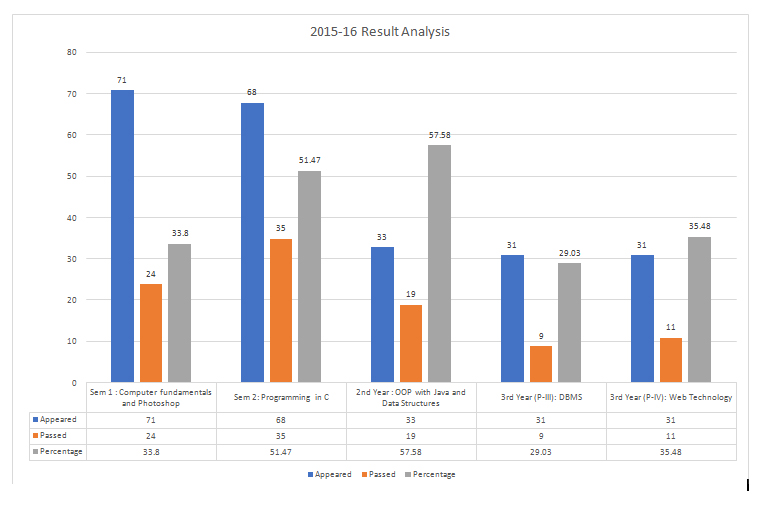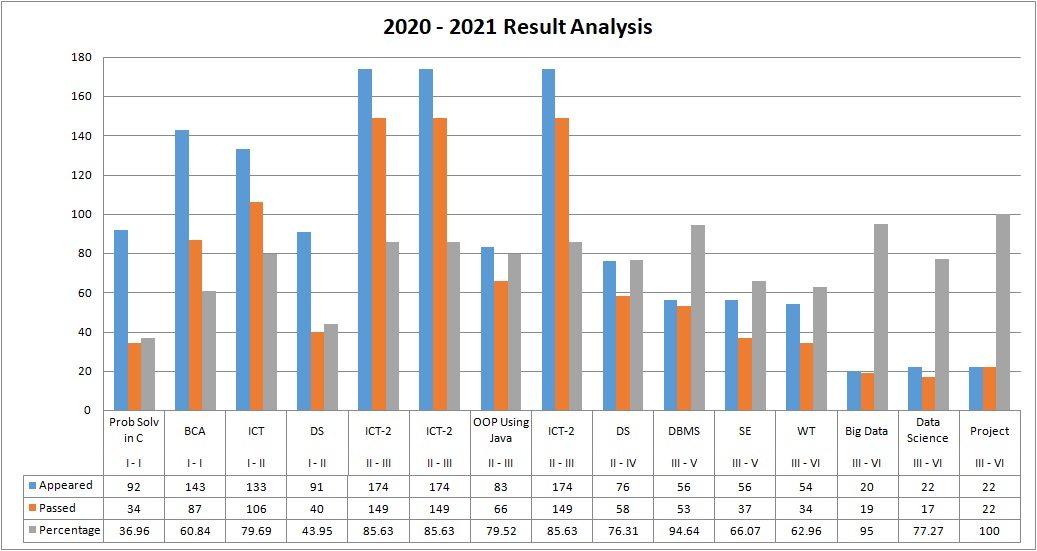
The Department of Computer Science was established in the year 2001-02. It administers Two Under Graduate programs in Computer Science with the combinations Mathematics, Physics, Computer Science and Mathematics, Chemistry, Computer Science.
Department continuously strives hard to strengthen the technical skills of the students by conducting several workshops, seminars and guest lecturers along with regular curricular activities. Our department has come up with many digital initiatives like Online Teaching, Organizing inhouse FDP's on digital tools, Online Certificate Courses, designing LMS, Virtual Classrooms, participating in live Manatv classes, etc. Various online open tools like Google Class Rooms, Google forms, Plickers, etc are being used for regular class room teaching-learning-evaluation process.
Department is having skilled and committed faculty. Currently the department is having 3 regular faculty members. They are publishing their research articles in various reputed journals and conferences.
S.No |
Name |
Designation |
Qualification |
Photo |
Curricullum Vitae |
|---|---|---|---|---|---|
| 1 | Sri Niranjan Mulaveesala | Lecturer In-Charge | M.Tech |  |
View CV |
| 2 | Sri A Anil Babu | Guest Lecturer | MCA | ||
| 2 | Sri T Venkata Narayana | Guest Lecturer | MCA |
S.No |
Name |
Designation |
Qualification |
|---|---|---|---|
| 01 | Ch. Chittibabu | Record Assistant | B.A. |
S.No |
Year of Starting |
Title of the Program |
LEVEL (UG, PG) |
Duration (Years) |
Sanctioned Annual Intake |
1 |
2001 |
B.Sc (Mathematics, Physics, Computer Science) |
UG |
3 |
50 |
2 |
2015 |
B.Sc (Mathematics, Chemistry, Computer Science) |
UG |
3 |
60 |
3 |
2021 |
B.Com. (Computer Applications) |
UG |
3 |
30 |
4 |
2022 |
M.Sc. (Computer Science) |
PG |
2 |
30 |
Academic Year:2019-2020
Semester: I Sem
Class : I B.Sc. MPCs & MCCs
Subject: Computer Fundamentals & Photoshop
Course Objectives:
This course will introduce fundamentals of computers and some of the basic concepts of Adobe Photoshop like Photoshop environment, Photoshop Toolbox, etc.
Course Outcomes:
To explore basic knowledge on computers and Photoshop’s beauty from the practical to the painterly artistic and to understand how Photoshop will help you create your own successful images
Academic Year : 2019-2020
Semester: II Sem
Class : I B.Sc.MPCs & MCCs
Subject: Programming in C
Course Objectives:
Course Outcomes:
Upon successful completion of the course, a student will be able to:
Academic Year : 2019-2020
Semester: III Sem
Class : II B.Sc. – MPCs & MCCs
Subject: Object Oriented Programming Using JAVA
Course Objectives:
As the business environment becomes more sophisticated, the software development (software engineering is about managing complexity) is becoming increasingly complex. As of the best programming paradigm which helps to eliminate complexity of large projects, Object Oriented Programming (OOP) has become the predominant technique for writing software in the past decade. Many other important software development techniques are based upon the fundamental ideas captured by object-oriented programming.
Course Outcomes:
At the end of this course student will:
Academic Year : 2019-2020
Semester: IV Sem
Class : II B.Sc. MPCs & MCCs
Subject: Data Structures
Course Objectives:
To introduce the fundamental concept of data structures and to emphasize the importance of data structures in developing and implementing efficient algorithms.
Course Outcomes:
At the end of this course student will:
Academic Year : 2019-2020
Semester: V Sem
Class : III B.Sc. MPCs & MCCs
Subject: Data Base Management Systems
Course Objectives:
Design & develop database for large volumes & varieties of data with optimized data processing techniques.
Course Outcomes:
At the end of this course student will:
Academic Year : 2019-2020
Semester: V Sem
Class : III B.Sc. MPCs & MCCs
Subject: Software Engineering
Course Objectives:
The Objective of the course is to assist the student in understanding the basic theory of software engineering, and to apply these basic theoretical principles to a group software development project.
Course Outcomes:
Academic Year : 2019-2020
Semester: VI Sem
Class : III B.Sc. – MPCs & MCCs
Subject: Web Technologies
Course Objectives:
Course Outcomes:
Academic Year : 2019-2020
Semester: VI Sem
Class : III B.Sc. MPCs & MCCs (Cluster1)
Subject: Foundations of Data Science (A1)
Course Objectives:
Modern scientific, engineering, and business applications are increasingly dependent on data, existing traditional data analysis technologies were not designed for the complexity of the modern world. Data Science has emerged as a new, exciting, and fast-paced discipline that explores novel statistical, algorithmic, and implementation challenges that emerge in processing, storing, and extracting knowledge from Big Data.
Course Outcomes:
At the end of this course student will:
Academic Year : 2019-2020
Semester: VI Sem
Class : III B.Sc. MPCs & MCCs (Cluster1)
Subject: Big Data Technology (A2)
Course Objectives:
The Objective of this course is to provide practical foundation level training that enables immediate and effective participation in big data projects. The course provides grounding in basic and advanced methods to big data technology and tools, including MapReduce and Hadoop and its ecosystem.
Course Outcomes:
At the end of this course student will:
PSO1: Ability to apply Foundations of Mathematics, Principles of Physics and theory of Computer Science in solving the real world problems.
PSO2: Ability to choose, create and apply the appropriate techniques, resources and tools to predict and model complex situations within the scope and boundaries of the situation.
PSO3: Create, select, and apply appropriate techniques, resources, and modern IT tools including prediction and modeling to complex activities with an understanding of the limitations.
PSO4: Exhibit comprehension and understanding of the programmes and apply them in a multidisciplinary environment.
PSO5: Communicate effectively on various activities and make effective presentations.
| Seminars |  |
Quizzes |  |
|
| Assignments |  |
Remedial Classes |  |
| Assignments |  |
Seminars |  |
|
| Extension Activities |  |
Remedial Classes |  |
|
| Quizzes |  |
| S.No | Date | Conducted By | Name of The Activity | Details of Resource Person | No of Participants | Report |
|---|---|---|---|---|---|---|
| 01 | 25-10-2021 to 25-12-2021 |
Computer Science | CISCO Networking Academy Certificate Course on Networking Essentials |
G. Raviteja | 84 | Click Here |
| 02 | 02-12-2021 | Computer Science | Online Quiz on World Computer Literacy Day |
Computer Science Faculty | 664 | Click Here |
| 03 | 28-12-2021 | Computer Science | Guest Lecture on Data Mining |
K. Naga Sireesha Asst Prof SJCW (A) Visakhapatnam |
39 | Click Here |
| 04 | 30-12-2021 | Computer Science | Student Seminar Day |
Computer Science Faculty | 60 | Click Here |
| 05 | 01-01-2022 | Computer Science | Release of Calendar 2022 |
Computer Science Faculty | Staff & Students | Click Here |
| 06 | 03-01-2022 to 07-01-2022 |
Computer Science | Crash Course on Fundamentals of IT |
Computer Science Faculty | 56 | Click Here |
| 07 | 03-01-2022 to 03-02-2022 |
Computer Science | CISCO Networking Academy Certificate Course on Introduction to IoT |
G. Raviteja | 71 | Click Here |
| 08 | 04-02-2022 | Computer Science | Facebook Day | Computer Science Faculty | 69 | Click Here |
| 09 | 28-02-2022 | Computer Science | Seminar Day | Computer Science Faculty | 69 | Click Here |
| 10 | 15-02-2022 to 15-03-2022 |
Computer Science | CISCO Networking Academy Certificate Course on CCNA Module 1 |
G. Raviteja | 51 | Click Here |
| 11 | 19-02-2022 to 19-03-2022 |
Computer Science | CISCO Networking Academy Certificate Course on Introduction to Cyber Security |
G. Raviteja | 43 | Click Here |
| 12 | 23-03-2022 | Computer Science | TechSavvy | Mr. D. Ramesh III B.Sc- MPCS |
48 | Click Here |
| 13 | 15-03-2022 to 15-04-2022 |
Computer Science | CISCO Networking Academy Certificate Course on CCNA Module 2 |
G. Raviteja | 47 | Click Here |
| 14 | 15-04-2022 to 15-05-2022 |
Computer Science | CISCO Networking Academy Certificate Course on CCNA Module 3 |
G. Raviteja | 35 | Click Here |
| Assignments |  |
Quizzes |  |
|
| Remedial Classes |  |
Seminars |  |
| Assignments |  |
Quizzes |  |
|
| Remedial Classes |  |
Seminars |  |
| Assignments |  |
Quizzes |  |
|
| Remedial Classes |  |
Seminars |  |
| Assignments |  |
Quizzes |  |
|
| Remedial Classes |  |
Seminars |  |
| S.NO | Title of paper | Name of the author/s | Department | Name of journal | Year of Publication | ISBN / ISSN number | DOI Link |
| 1 | Unsupervised linear contact distributions segmentation algorithm for land cover high resolution panchromatic images. | A.V. Kavitha, Dr. A.Srikrishna and Dr. Ch. Satyanarayana |
Computer Science | Multimedial Tools and Applications (Web of science - SCI indexed Springer publications) | 2020 | ISSN 1380-7501 | https://doi.org/10.1007/s11042-018-6693-y |
| 2 | Crop image classification using spherical contact distributions from remote sensing images. | A.V. Kavitha, Dr. A.Srikrishna and Dr. Ch. Satyanarayana |
Computer Science | Jounal of King soudh University – Computer and Information sciences (Web of science - ESCI indexed and Scopus indexed) | 2020 | ISSN 1319-1578 | https://doi.org/10.1016/j.jksuci.2019.02.008 |
| 3 | Classification of Land cover from Remote sensing images using Morphological Linear contact distributions and Rough Sets. | A.V. Kavitha, Dr. A.Srikrishna and Dr. Ch. Satyanarayana |
Computer Science | International journal of Recent technology and Engineering (Scopus indexed) | 2020 | ISSN: 2277-3878 | https://doi.org/10.35940/ijrte.B2822.098319 |
| 4 | An Efficient Network Intrusion Detection System Using Prospective Backward Oracle Matching Algorithms: An Architectural Approach | G. Raviteja | Computer Science | International Journal of Computer Information Systems and Industrial Management Applications (Scopus Indexed) | 2020 | ISSN 2150-7988 | Click Here |
| 5 | Unsupervised linear contact distributions segmentation algorithm for land cover high resolution panchromatic images. | A.V. Kavitha, Dr. A.Srikrishna and Dr. Ch. Satyanarayana |
Computer Science | Multimedial Tools and Applications (Web of science - SCI indexed Springer publications) | 2020 | ISSN 1380-7501 | Click Here |
| 6 | An efficient texture feature extraction algorithm for high resolution land cover remote sensing image classification. | A.V. Kavitha, Dr. A.Srikrishna and Dr. Ch. Satyanarayana |
Computer Science | International journal of image, graphics and signal processing (IJIGSP) | 2018 | ISSN: 2074-9082 | Click Here |


